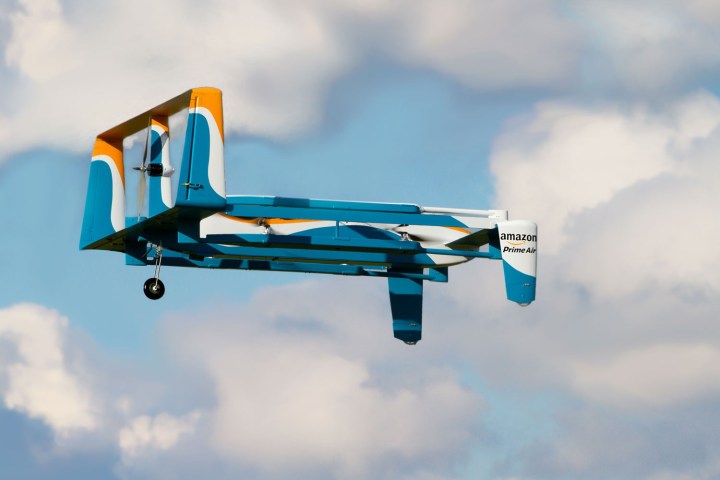
Whether or not Amazon’s R&D team comes up with most of its ideas during Friday night drinks is immaterial. The reality is that, possibly on a Monday morning, it files those ideas with the United States Patent and Trademark Office (USPTO) and, after a period of time, the USPTO grants Amazon the patent.
Some of those patents will be forgotten by the Seattle-based company over time and therefore never see the light of day, but as technology develops, others may eventually come to fruition.
As an example, it’s hard to believe Amazon’s “floating warehouse” will ever get off the ground, though this remarkable “beehive” drone tower seems a little more feasible. And as for the tiny “assistant drones” to help cops in their work, well, the jury’s still out on that one.
The latest Amazon patent to be granted by the USPTO describes a drone-based system for delivering energy to electric vehicles as they’re driving along. Put simply, the method would involve a drone flying to an electric vehicle, landing on it, and charging it before flying back to base. The drone would identify the car from a code on its roof, and then dock to begin the process of topping up the battery.
The idea tackles the issue of electric vehicles running low on power during long journeys, though Amazon could end up ditching the idea as technology for such vehicles continues to develop at a rapid pace. Indeed, Amazon filed its patent in 2014, a time when the car-battery issue was more pressing. The USPTO granted the patent just this month.
There’s also the small matter of charging the drones with enough energy to get to the car that’s running low on power, though another Amazon patent from a few years ago suggests it could use church steeples and other landing spots as recharging stations to increase a drone’s reach.
And for how long would the drone have to stay perched on the car? At the current time, Tesla’s Supercharger stations can offer a decent charge in as little as 30 minutes, though other systems take longer. Amazon’s drone would have to pack some pretty powerful technology.
Another more challenging obstacle is the fact that many kinds of commercial drone operations are still strictly limited in the U.S., so even if Amazon develops the technology, someone from the Federal Aviation Administration is likely to be standing there wagging their finger disapprovingly.
It’s always interesting to see what tech firms are cooking up with their patent ideas. The technology they describe can change over time and be used in different ways later on, but if we’re ever going to see cars hurtling down the highway with a power-giving drone perched on top, well, it certainly won’t be happening anytime soon.


